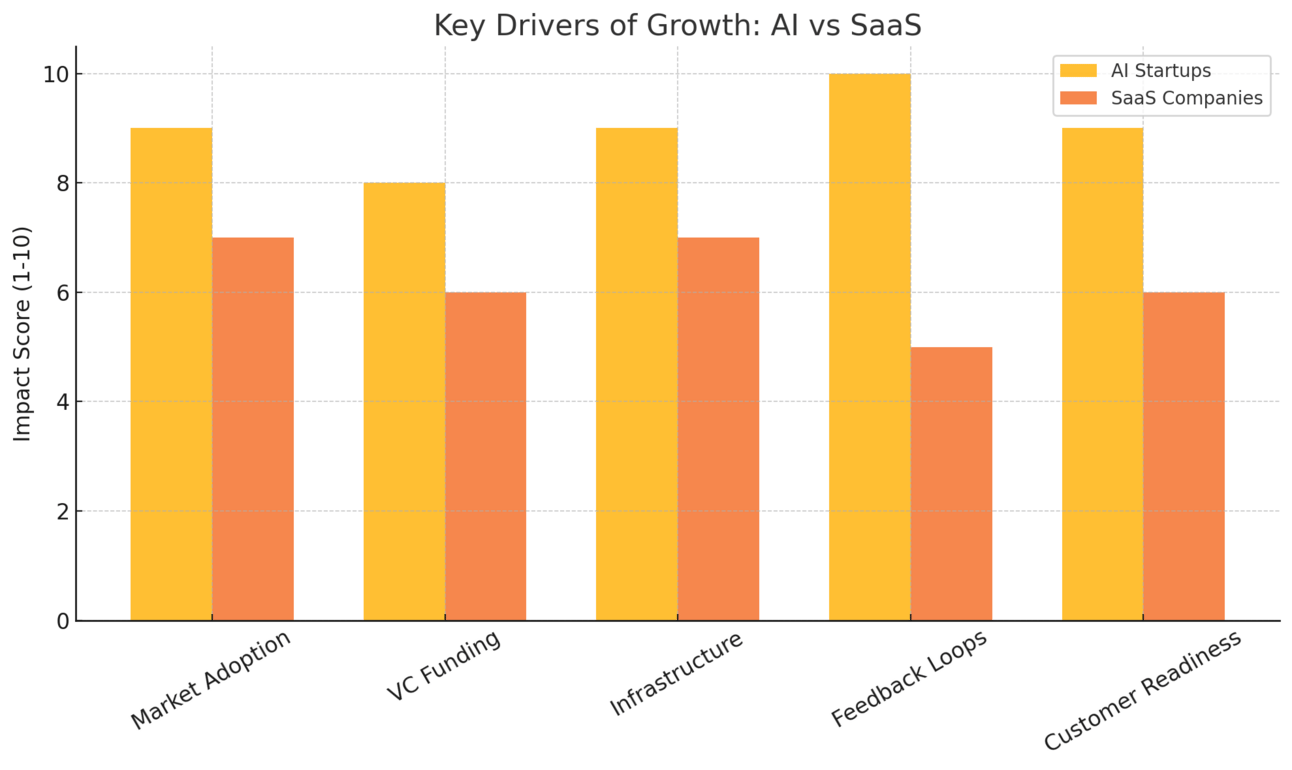- Growth Elements
- Posts
- AI vs SaaS: How AI Startups Are Scaling 5x Faster and Redefining Growth Benchmarks
AI vs SaaS: How AI Startups Are Scaling 5x Faster and Redefining Growth Benchmarks
Read time: 3 minutes.
Welcome to the 78th edition of The Growth Elements Newsletter. Every Monday and sometimes on Thursday, I write an essay on growth metrics & experiments and business case studies.
Today’s piece is for 6,500+ founders, operators, and leaders from businesses such as Shopify, Google, Sage, Hubspot, Zoho, RateGain, Zaggle, Servcorp, and Apollo.
Today’s The Growth Elements is brought to you by:
The gold standard of business news
Morning Brew is transforming the way working professionals consume business news.
They skip the jargon and lengthy stories, and instead serve up the news impacting your life and career with a hint of wit and humor. This way, you’ll actually enjoy reading the news—and the information sticks.
Best part? Morning Brew’s newsletter is completely free. Sign up in just 10 seconds and if you realize that you prefer long, dense, and boring business news—you can always go back to it.
Your daily AI dose
Mindstream is your one-stop shop for all things AI.
How good are we? Well, we become only the second ever newsletter (after the Hustle) to be acquired by HubSpot. Our small team of writers works hard to put out the most enjoyable and informative newsletter on AI around.
It’s completely free, and you’ll get a bunch of free AI resources when you subscribe.
Get Your Team Booked on 3.8 Million Podcasts Automatically
It's 2025. Want to finally be a regular podcast guest in your industry? PodPitch will make it happen. Even the beehiiv team uses it!
The best way to advertise isn't Meta or Google – it's appearing on podcasts your customers love.
PodPitch.com automates thousands of weekly emails for you, pitching your team as ideal guests.
Big brands like Feastables use PodPitch.com instead of expensive PR agencies.
Thank you for supporting our sponsors, who keep this newsletter free.
The Accelerated Growth Trajectory of AI Startups vs SaaS Companies. This Essay highlights how AI startups achieve $30 million in revenue far quicker than SaaS companies.
Key drivers and the impact of factors like market adoption, VC funding, infrastructure, feedback loops, and customer readiness on AI and SaaS growth.
[1] Growth Comparison: AI vs SaaS
AI startups scale exponentially: Median time to reach $30 million annualised revenue is 12-15 months, showing viral growth patterns.
SaaS grows steadily: It takes nearly 60 months to achieve the same milestone, following a predictable, linear trajectory.
Implication: AI startups are reshaping growth benchmarks, scaling 4-5x faster than SaaS counterparts.
[2] Why AI Startups Scale Faster
Instant market adoption: AI technologies solve pressing problems like automation, cost efficiency, and predictive insights, driving immediate enterprise and consumer demand.
Example: OpenAI’s ChatGPT reached 100 million monthly users in just two months, a milestone SaaS companies take years to achieve.
VC investment surge: Investors are drawn to AI's transformative potential, resulting in large early-stage funding rounds that fuel hypergrowth.
Example: Jasper.ai raised $125 million within 18 months, achieving a $1.5 billion valuation.
Infrastructure readiness: Cloud computing, pre-trained models, and open-source tools (like Hugging Face) drastically reduce development time and costs.
Data-driven feedback loops: AI products improve with usage, creating self-reinforcing growth cycles that SaaS lacks.
Market readiness: Enterprises prioritise AI adoption to gain a competitive advantage, accelerating deal closures and scaling.

[3] SaaS Growth Dynamics
Sales-driven model: SaaS companies rely on subscription revenue but face long sales cycles, particularly in B2B markets.
Example: Salesforce grew steadily by focusing on enterprise contracts and retention over viral adoption.
Retention-focused growth: SaaS emphasises customer retention and account expansion rather than explosive user acquisition.
Competitive saturation: The SaaS market is more mature, requiring significant differentiation efforts to win market share.
[4] Implications for Startups
For AI startups:
Rapid scaling requires operational readiness—focus on hiring top talent, building scalable infrastructure, and navigating regulatory compliance.
Differentiation will become critical as the market saturates with AI solutions.
For SaaS startups:
Integrating AI capabilities can enhance product offerings and unlock new growth opportunities.
Shifting toward “AI-enhanced SaaS” models could help traditional SaaS companies compete more effectively.
Exploring niche markets (e.g., vertical SaaS solutions for specific industries) can create defensible growth.
For investors:
AI offers quicker returns but comes with higher risks due to heightened competition and operational challenges.
SaaS remains a safer long-term investment, with steady revenue compounding over time.
[5] Challenges in AI Growth
Operational scaling: Hiring skilled talent and managing infrastructure demands can become bottlenecks.
Ethical scrutiny: Issues like data privacy, algorithmic bias, and regulatory oversight are growing concerns for AI startups.
Market saturation risk: With the flood of new AI players, maintaining differentiation and customer trust will become harder.
[6] Future Trends
AI startups:
Adoption of AI governance frameworks to address ethical and compliance challenges.
Increased focus on vertical AI solutions tailored to specific industries.
SaaS companies:
Emergence of hybrid AI-SaaS models that merge the scalability of SaaS with the intelligence of AI.
Growing opportunities in underpenetrated markets like SMB SaaS and regional SaaS solutions.
Final Words
AI startups achieved milestones in months that SaaS companies took years to reach.
This accelerated trajectory stems from immediate market demand, technological readiness, and substantial venture capital backing.
While SaaS companies continue to grow steadily, they must adapt to this shifting dynamic by leveraging AI and exploring niche markets.
Startups and investors who align with these trends will lead the next wave of innovation.
That's it for today's article! I hope you found this essay insightful.
Wishing you a productive week ahead!
I always appreciate you reading.
Thanks,
Chintankumar Maisuria


